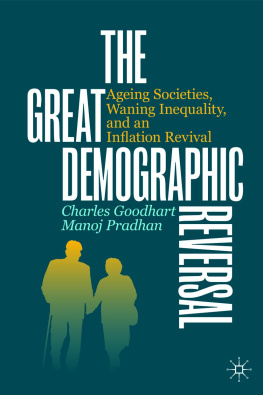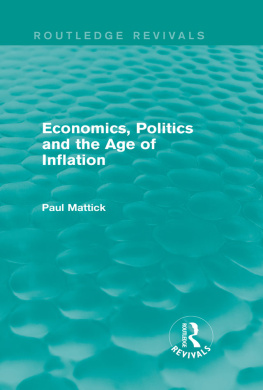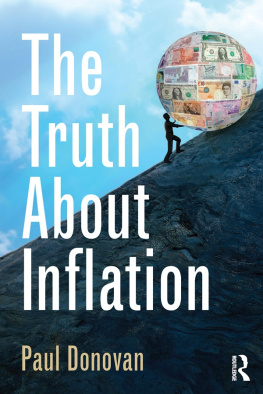Charles Goodhart
London School of Economics, London, UK
Manoj Pradhan
Talking Heads Macro, London, UK
ISBN 978-3-030-42656-9 e-ISBN 978-3-030-42657-6
https://doi.org/10.1007/978-3-030-42657-6
The Editor(s) (if applicable) and The Author(s), under exclusive license to Springer Nature Switzerland AG 2020
This work is subject to copyright. All rights are solely and exclusively licensed by the Publisher, whether the whole or part of the material is concerned, specifically the rights of translation, reprinting, reuse of illustrations, recitation, broadcasting, reproduction on microfilms or in any other physical way, and transmission or information storage and retrieval, electronic adaptation, computer software, or by similar or dissimilar methodology now known or hereafter developed.
The use of general descriptive names, registered names, trademarks, service marks, etc. in this publication does not imply, even in the absence of a specific statement, that such names are exempt from the relevant protective laws and regulations and therefore free for general use.
The publisher, the authors and the editors are safe to assume that the advice and information in this book are believed to be true and accurate at the date of publication. Neither the publisher nor the authors or the editors give a warranty, expressed or implied, with respect to the material contained herein or for any errors or omissions that may have been made. The publisher remains neutral with regard to jurisdictional claims in published maps and institutional affiliations.
Cover image: ducu59us shutterstock.com
This Palgrave Macmillan imprint is published by the registered company Springer Nature Switzerland AG
The registered company address is: Gewerbestrasse 11, 6330 Cham, Switzerland
Preface (April 4 Version)
In this book, we focus on the effects of demography and globalisation on longer run trends in finance and the real economy. Such trends are usually slow-moving and operate at the global, rather than national, level. Since the concern of most macroeconomic analysis is on developments at the cyclical frequency and at the national level, we believe that the importance of these factors has been largely overlooked. Our global and structural focus has provided us with more than enough material for quite a long book.
We do not, indeed we could not, try to encompass all the other myriad issues that will affect our longer-term economic future, such as climate change and technological developments, largely because many others, much more expert than ourselves, have taken up such subjects. And there are the unknown unknowns, which will probably become the dominant influence on all our future lives.
Our main thesis is that such demographic and globalisation factors were largely responsible for the deflationary pressures of the last three decades, but that such forces are now reversing, so that the worlds main economies will, once again, face inflationary pressures over the next three, or so, decades. The question, which we have been most frequently asked, is Just when will the point of inflexion from deflation to inflation occur? When we were writing this book in 2019, we had to answer that we did not know to within five years, or so.
That was, of course, before the coronavirus pandemic hit in early 2020; the occurrence of such a pandemic being a known unknown. The overall impact of the pandemic will be to accelerate the trends we have outlined in this book. China will become more inward-looking and less deflationary globally, and inflation itself will rise much earlier and faster than we had anticipated. Because of the importance of this to the issues that we raise in our book, our publisher kindly agreed to allow us to append a short epilogue (postscript) to the book.
This is primarily an empirical book and could not have been completed without the invaluable research assistance and insights into the data by Patryk Drozdzik and Bo Tang, and Marina Emonds organisation and preparation of our manuscript. We are indebted to them for their tireless work. We would like to thank Pratyancha Pardeshi for her help in our early work on these themes.
Data, however, need to be transformed, mainly by theory, into narratives to be comprehensible and persuasive. For that, of course, we are beholden to many who have preceded us, for example, the literature kicked off by Bill Phillips in Chapter , and to Carol Jagger and her co-authors, for permission to reproduce Tables from the PACSim modelling study; and Chris Lynch and Alzheimers Disease International for permission to reprint Tables from various World Alzheimer Reports. The insights we gleaned from the conference convened by the Global CEO Initiative on Alzheimers Disease were most helpful. Our thanks go to George Vradenburg and Drew Holzapfel, and separately to Natalia Shelvey. Similarly, we are grateful to Michael Devereux and his co-authors for permission to reprint the whole Executive Summary from their paper on Destination-Based Cash Flow Taxation, and for his helpful comments on our draft. We also thank Benoit Mojon and Xavier Ragot for help with participation data.
Besides these, we also thank:
The Bank of England for permission to reprint a Figure from G. Gutirrez and S. Piton (2019), and two Figures from the July 2019 Financial Stability Report.
The Federal Reserve Bank of St Louis for permission to reprint a Figure from R. Hernndez-Murillo, et al. (2011).
Taylor and Francis for permission to reprint a Figure from G. Meen (2005).
The London Institute of Banking and Finance for permission to reprint some paragraphs from L. Mayhew in Financial World (2019).
The Banco de Espaa for permission to reprint a Table from Y. Aksoy, et al. (2015).
Rightslink for permission to reprint a Table from M. Heise (2019).
Brookings for permission to reproduce a Figure from L. Rachel and L. H. Summers (2019).
Marketplace Copyright for permission to reprint Paragraphs and Figures from W. Gbohoui, et al. (2019).
The American Economic Association for permission to reproduce two Figures from D. H. Autor (2019); reproduced with the permission of the American Economic Association Papers & Proceedings.
Statista for permission to reprint one of their Figures.
The High Pay Centre for permission to reproduce one of their Figures.
More generally our thanks are due to Hyun Shin for encouraging us to write this extended book. We are especially grateful to Haizhou Huang for carefully reading the whole book, and for greatly improving our chapter on China. Similarly, our thanks go to Takatoshi Ito-San for help with our chapter on Japan. We have been fortunate to have had helpful publishers in Palgrave Macmillan, particularly in the persons of Tula Weis, Rachel Sangster, Lucy Kidwell and Azarudeen Ahamed Sheriff.
But above all our greatest debt is to Miffy Goodhart and the Pradhan family, who cannot remember when previously we have been so inattentive, and have still forgiven us.
Charles Goodhart
Manoj Pradhan
London, UK







